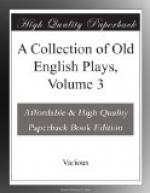Char. What pageants thys that on the fallowd lands Crosses me everye way? I cannot goe But styll he meets me full jumpe.
Tur. Beleve me, Sir.
I have not seen an antycke more disguysed.
A gallopps ore the newe plowde lands as fast
As twere a comon hye way, yet no speeche
Can make hym to forsake theym.
Eud. Nay, whats more,
The beast he rydds on is not usuall,
Tys neyther horsse nor asse, and yet a beast
Nymble & fytt for burthen.
Char. Eudon, goe
Bydd hym dismounte & as he loves hys life
Presentlye come before us. I will knowe [Ex.
Eudon.
The ende of thys straunge purposse. Suer there
must
Some secrett hange uppon it! thyngs doone thus
Are seldome jests, unlesse jests seryous.
Enter Eudon & Busse, leading
in twoe lymes Byrtha
& a Spaniell, hymselfe cladd
all in nett.
O tys La Busse; I’ve founde hys stratagem.—
Nowe, Sir, y’are wellcome; whence growes thys
dysguyse?
Bus. Sir, from the fayre protectyon of
your grace
And satisfactyon of your vowe; which doone,
Bouldlye I hope I may voutsafe to begge
My fathers deare deliverance.
Char. Noble sonne,
What wouldst thou doe hadst thou a noble father!
But come, sir, synce you putt me to the test,
Resolve the doute: your fathers pardoned
When you shall meet me uppon no hye way.
Bus. Which even nowe I did: the fallowe lands, Newe plowed & tylld are free from passengers.
Char. Tys graunted; but your selfe, Sir, must not ryde Of horse nor mare nor asse, & yet the beast An usuall thynge for burthen.
Bus. Suche is myne, A Mule, that is the bastard breede betwyxte An asse & mare, & onlye fytt for labor.
Char. But, sir, you must be neyther cloathed nor naked.
Bus. Nor am I, myghtie Sir: thys pore thynne nett Nor leaves me nakt nor yet dothe cover me.
Char. You prettylie orereache me; but you must Bringe in your hand the faythfullst frend you challenge.
Bus. Thys is he, my faythfull trustye spanyell, The verye typpe & truthe of true affectyon.
Char. But with hym must be joynd your greatest enemye.
Bus. They are not farre assunder:
a curst wife
Is evermore mans worst aflyctyon,
And shee that outgoes myne in bytternes
May fryght the whole worlde.
Char. Come, y’are ingenyous,
And I confes th’ast conquerd, thoughe I knowe
Thy father houlds as much unworthynes
As may excusse tyrranye in a prynce:
Yet for thys goodnes & thys industrye,
Th’example of the sweetest disposytion,
For all th’offences yet reveald unto me
I freelye pardon hym.
Bus. And you are good And like your selfe, a verye god[103] in pyttie.




